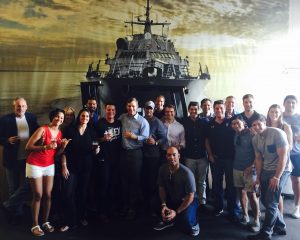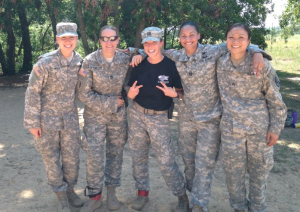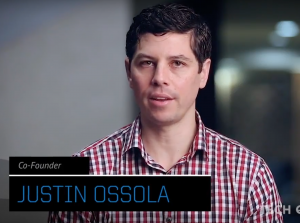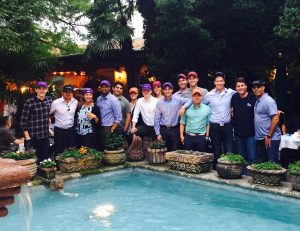By Dan Zehr – American-Statesman Staff
If Michael Lynn didn’t fully understand the instability that military life can inflict on a soldier’s family, he got a better sense for it in 2012.
When Lynn, then a counterespionage case officer in the U.S. Air Force, stepped off a plane in Afghanistan that July, his father and brother were there to greet him. The following day, his wife arrived for her own deployment.
“All four of us were there while mom was back in Reston with the dogs,” Lynn said. “She’s a strong lady.”
Such is life in a family dedicated to the military and the foreign service. But when Lynn’s daughter was born in January 2014, he and his wife also knew they wanted a different life for her.
“My wife and I took a good hard look at where we came from and where we were going,” he said. “We didn’t want to have her face mom and dad deploying.”
So over the next year, they started planning for life after the military. On the advice of a mentor, they saved enough money to cover a six-month transition. And by the end of last year, while starting the official transition process, Lynn linked up with a recruiting firm that placed with veterans with private-sector companies.
He went through multiple rounds of interviews, but nothing quite fit. And then he heard from Justin Ossola.
Ossola worked for Tech Qualled, a firm launched by a retired Austin tech executive to train soldiers for advanced, high-tech sales jobs. The company had just joined the host of training and recruitment firms that try to help the tens of thousands of veterans who transition from military to civilian life each month.
Most training programs focus on enlisted soldiers. But Tech Qualled offered a different approach.
It recruits officers and college-educated enlisted soldiers who, after an intense 10-week training course, can slot comfortably into technically demanding sales roles at high-tech companies. And it supplements that curriculum with a full-service support program designed to help students navigate their transition into civilian life.
Because it was so new, Lynn was skeptical at first. But he had also started to feel increasingly anxious about his pending shift out of the Air Force, which he’d joined straight out of Boston University. The breadth of support won him over.
“We knew it was a gamble, especially since we were class No. 1,” he said. “But having met the Tech Qualled team and seen the dedication and commitment they were bringing to the table, I knew even If I had to give it another few weeks they were going to see it through and put me in front of a company that wanted me on their team.”
All 11 members of the first class have landed jobs. Lynn and his family moved to Austin, where he works as an enterprise account executive with Blackberry.
‘Working for a purpose’
Jim Sherriff has no military experience, but he knows how fraught the soldier-to-civilian crossover can be. His two nephews struggled when they cycled out of the military. One eventually made it through; the other took his own life.
“My brother dealt with his grief by starting a foundation that helped veterans who were struggling with their transitions,” Sherriff said. “It had really good intentions, but it was not a scalable model.”
Having wrapped up a 35-year career in executive and sales leadership roles with Hewlett-Packard and Cisco, Sherriff dedicated himself to developing a self-sustaining organization that could help veterans make that transition.
He and his wife, Karen, developed Tech Qualled. (The name is a play off the military jargon for “qualified.”) They initially saw it as a nonprofit training program, but they made two critical changes while participating in Harvard University’s Advanced Leadership Initiative — a program for people ” transitioning from working for a living to working for a purpose,” Sheriff said.
First, they decided to launch as a for-profit company, so they could attract more funding and talent. Then they brought on Ossola and Nick Breedlove, two veterans who were working toward master’s degrees and brought extensive military experience.
And then the Sherriffs took it a step further, designing a corporate and capital structure that, over time, will shift majority ownership of the company to the veterans who work there.
Do something different
Today, Tech Qualled offers an account executive track, which readies students for external sales roles, and an engineering management track, which trains veterans for technical roles associated that support sales teams.
It’s free for the veterans who participate, Sherriff said, with revenue coming from placement fees paid by companies.
For employers like Wayne Fullerton, senior vice president for sales at PCM-G, which sells technology to the armed forces and other public-sector customers, the combination of military experience and private sector skills makes the investment well worth it.
“I think it gives me an unfair advantage over my competitors who aren’t hiring the veterans who know the mission,” Fullerton said. “I’m hiring guys who did it.”
Fullerton said he appreciated the altruistic side of hiring veterans, but he’s run the numbers and seen a financial return on the placement fees he pays Tech Qualled to hire its graduates. He hired three from the first cohort and is already talking to some of the program’s 15 current students.
But that’s not always an easy blend to create.
“The perception is that veterans are too hierarchical and structured,” Sherriff said. “They need to be able to deal with more ambiguity and flexibility, especially in a sales role.”
Tech Qualled bakes that into the program. For example, it leaves instructions in its online exercises vague or open to interpretation, pushing veterans used to the military’s structure to think more creatively. They even bring a Dallas improv comedy troupe in as an icebreaker for boot camp.
The training and support aren’t cheap — currently costing Tech Qualled in excess of $10,000 to put a student through the program, Sheriff said. But he said he expects those costs to drop as the program adds more capacity and they put processes in place to support students without the heavy oversight needed in the startup phase.
For now, Sherriff said he is more concerned about getting transitioning soldiers into the Tech Qualled program. So he, Ossola and the rest of the team are busy reaching out to soldiers like Michelle Kimbrough, one of the program’s current students.
A graduate of West Point, Kimbrough hopes to find a job near Fort Bragg, where her husband is stationed as a newly minted Green Beret. It can be harder to find jobs in specific locations, and as of last week she was preparing for some second-round interviews.
After seven years in the military, she said, the transition was going well, even though she hadn’t followed the same path her West Point classmates took. Many had gone on to graduate school. Most of the rest linked up with recruiting and job-placement agencies.
“And then there’s the rest of us,” she said, “who kind of want to do something different.”
Link to original article: http://atxne.ws/28FiAAT



 It is true that there are a ridiculous number of publications and tech manuals at your disposal, however, this couldn’t be further from the truth. On a Navy ship, this is how problem-solving situation would typically play out for a division officer or senior enlisted leader. First, a piece of equipment breaks and everyone freaks out. The Captain and your Department Head authoritatively warn you that we cannot maintain our operational capabilities without this vital piece of equipment. “Fix it as soon as possible” they would exclaim! Second, you huddle up with your senior enlisted leaders and any technical resources you can pull in. Everyone comes in with a diversity of experiential advice, and as the leader, everyone is looking to you to synthesize these inputs and make sound decisions under pressure. So you leverage the resources you have, diving into tech manuals while listening to the experts around you; identify a root cause (probably not just one); work with Supply to procure parts which often are halfway around the world; and adjust your personnel and resources to compensate for the recently discovered degradation. Third, you stand up in front of the entire ship and brief your plan of action which typically gets rejected a few times before a positive consensus builds around your efforts. Every day leaders of all branches of the military, both officer and enlisted, experience rejection, pushback and pressure from stakeholders.
It is true that there are a ridiculous number of publications and tech manuals at your disposal, however, this couldn’t be further from the truth. On a Navy ship, this is how problem-solving situation would typically play out for a division officer or senior enlisted leader. First, a piece of equipment breaks and everyone freaks out. The Captain and your Department Head authoritatively warn you that we cannot maintain our operational capabilities without this vital piece of equipment. “Fix it as soon as possible” they would exclaim! Second, you huddle up with your senior enlisted leaders and any technical resources you can pull in. Everyone comes in with a diversity of experiential advice, and as the leader, everyone is looking to you to synthesize these inputs and make sound decisions under pressure. So you leverage the resources you have, diving into tech manuals while listening to the experts around you; identify a root cause (probably not just one); work with Supply to procure parts which often are halfway around the world; and adjust your personnel and resources to compensate for the recently discovered degradation. Third, you stand up in front of the entire ship and brief your plan of action which typically gets rejected a few times before a positive consensus builds around your efforts. Every day leaders of all branches of the military, both officer and enlisted, experience rejection, pushback and pressure from stakeholders.
 As the only enlisted soldier within my TQ cohort, my wariness was quickly put aside as I realized we were all one team no matter where we came from. I immersed myself into the in-depth 7-week online training and realized as each week passed that this was the correct decision. Although I did not consider myself a “techie,” the delivery of the material was easily digestible. Even though at times it seemed as if I was drinking from a fire hose, the things that make us veterans invaluable, our determination and perseverance, pushed me through.
As the only enlisted soldier within my TQ cohort, my wariness was quickly put aside as I realized we were all one team no matter where we came from. I immersed myself into the in-depth 7-week online training and realized as each week passed that this was the correct decision. Although I did not consider myself a “techie,” the delivery of the material was easily digestible. Even though at times it seemed as if I was drinking from a fire hose, the things that make us veterans invaluable, our determination and perseverance, pushed me through.


 “Working with Tech Qualled is mutually beneficial for our organizations,” said Wayne Fullerton, Senior Vice President of Sales for PCM-G. “We are honored and committed to help veterans transition back into the workforce. PCM-
“Working with Tech Qualled is mutually beneficial for our organizations,” said Wayne Fullerton, Senior Vice President of Sales for PCM-G. “We are honored and committed to help veterans transition back into the workforce. PCM-
 this suffering ends! So after the great excitement, I felt about being accepted into the Tech Qualled program wore off, I contemplated the anguish that was sure to come from 7 weeks of online training. Also, I had no idea of what to make of the two-week sales “boot camp” that accompanies the Launchpad Academy. But, I was ready for a challenge, a change of pace and a surefire way to break into high tech sales so I kept an open mind.
this suffering ends! So after the great excitement, I felt about being accepted into the Tech Qualled program wore off, I contemplated the anguish that was sure to come from 7 weeks of online training. Also, I had no idea of what to make of the two-week sales “boot camp” that accompanies the Launchpad Academy. But, I was ready for a challenge, a change of pace and a surefire way to break into high tech sales so I kept an open mind. direct insight into the world of technology and sales that we could not have gotten elsewhere. Throughout the rest of the week, if I had any questions about the material, I could reach out to any of the founders of the program, day or night, and they would ensure I fully grasped the concept. By founders, I mean individuals such a Jim Sheriff, a former top Cisco executive, and his wife Karen Sheriff who also has many years of experience in high tech sales and teaching. Once the week was completed, we commented on our end of the week discussion board, which brought on some very interesting interaction between other members of the cohort who may or may not have been just as challenged as me by some of the topics.
direct insight into the world of technology and sales that we could not have gotten elsewhere. Throughout the rest of the week, if I had any questions about the material, I could reach out to any of the founders of the program, day or night, and they would ensure I fully grasped the concept. By founders, I mean individuals such a Jim Sheriff, a former top Cisco executive, and his wife Karen Sheriff who also has many years of experience in high tech sales and teaching. Once the week was completed, we commented on our end of the week discussion board, which brought on some very interesting interaction between other members of the cohort who may or may not have been just as challenged as me by some of the topics.

